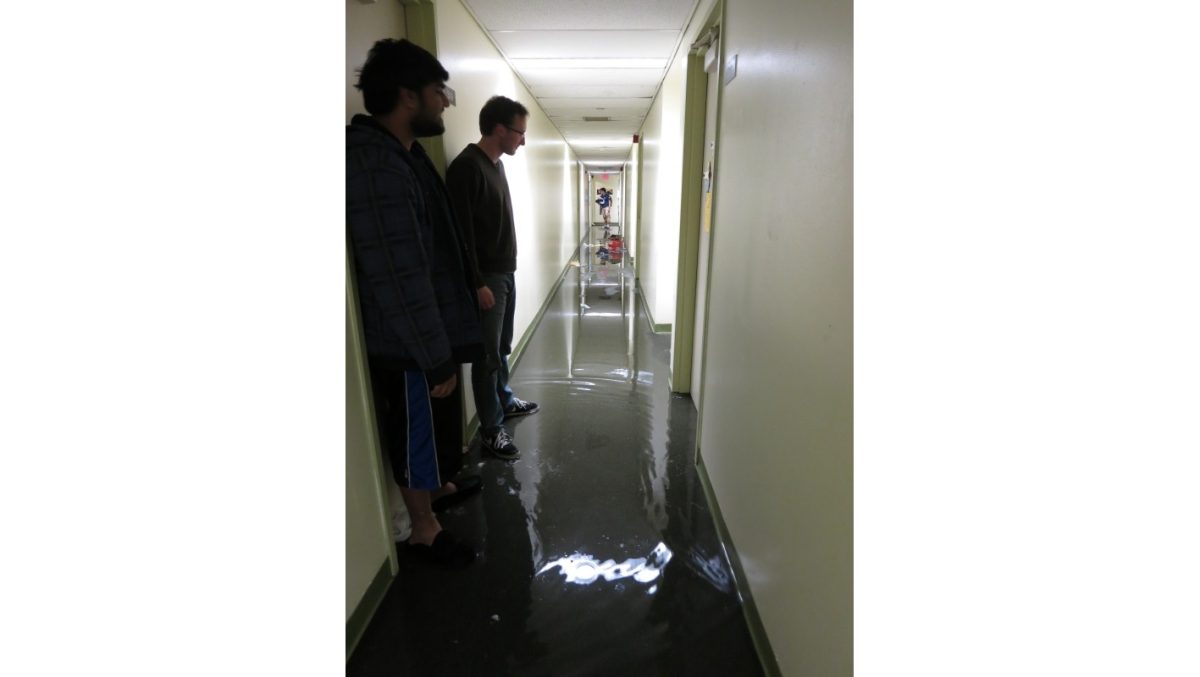Oak Hall residents had an unexpected addition to their final exams last semester: a pipe that broke on the 5th floor during the early hours of December 14th, sending water down walls and ceilings to the floors below.
ccording to accounts from administration, the incident occurred after a student attempted to use a toilet flusher handle with his foot, applying enough force to dislodge the threads between two pipe joins that had weakened due to age and wear – Oak Hall is at least thirty years old. This was the only point of damage to the plumbing system during the flood.
“It wasn’t anybody’s fault particularly,” said Jack Gentul, Dean of Students. The first sign of damage had been a leak reported earlier on Friday night to an RA. However, there had not been a chance for physical plant staff to assess or repair it before the incident occurred.
Although physical valves were turned off inside Oak by NJIT HVAC personnel, residual water continued to flow through the high pressure plumbing system. Turning off a street-level water mains valve would stop the water flow, but NJIT could not do this “because we’d be shutting off the fire suppression system as well,” said Gentul. Newark Fire Department personnel later arrived and handled this task.
Senior computer science major Michael Bianci says that during the incident, NJIT “handled it terribly.” He first noticed water flowing down his roommate’s side of the wall, then through their heating vent. When the fire alarm was pulled to evacuate students, Bianci said there was no accompanying announcement about the situation. Students who did not grab necessary items while exiting the building were out of luck, as they were not permitted to retrieve items until December 15th.
Displaced students sought shelter in other residence halls. At 5:16am, Michelle Geban, Oak Hall Residence Coordinator, sent an email to Oak residents informing them that they could move to temporary housing in Redwood starting at 8:30am. Bianci said that housing provisions and food were adequate for the situation.
Although some question the use of a fire alarm to evacuate a building not under immediate threat of fire, Gentul said, “getting everybody out to make sure they’re safe has got to be the number one priority.” Much of the water was flowing down walls into ceiling lights, posing an electrocution hazard.
From December 14th until completion of renovations, external contractor Pantheon worked with NJIT physical plant staff to drain water, dry out the building and perform renovations from floors 5 and below, largely financed by NJIT insurance. They repainted walls and replaced ceiling tiles, lighting, tile floors, carpeting and sheet rock. A professional cleaning company also arrived to clean the restrooms and kitchens, said Charles Nieves, Director of Physical Plant Building Services. Senior digital design major Jordan Surie noted, though, that his suitemate’s kitchen sink was left filled with “misty water” and a puddle on the kitchen floor.
Nicole Gabbard, a 5th year architecture major, said that students had been informed that any belongings left in rooms would be placed in boxes and bags. However, when she returned to her room, she saw belongings piled on her bed. Additionally, says Gabbard, some possessions were missing, including her roommate’s laptop, a box of change, and alcohol. Lynn Riker, Director of Residence Life, notes that communication could have been better, emphasizing that “everyone from floors 1 through 5 [should] move everything out.” Yashil Mudaliar, a non-resident visiting Gabbard at the time of the flood, said that at the very least, Residence Life kept students regularly and well informed about the aftermath and renovation process.
Joseph Tartaglia, Associate Vice President of Facilities Management, said that regular building assessments are carried out on campus, and physical plant staff are constantly monitoring the status of facilities. For instance, they monitor around 2000 small computers to keep an eye on HVAC systems on campus. “We are prepared,” he said. “We have emergencies every day [but] one of the problems is that as much as you try to deal with them, they change.”
Residence halls in particular are inspected by both physical plant and Residence Life staff during summers. However, the first line of damage prevention during the school year relies on student reports. Riker said clusters of reports help to highlight larger issues at hand, such as cracks on the base of Oak showers. Redoing the Oak showers is now a planned task after the Redwood renovations. “If you see something, say something.”
Renovations to Redwood Hall are still planned for completion by September 2014 or earlier. Though construction has not started, planning has been well underway. The two main tasks during this phase of the four year Redwood renovation plan are the installation of a second elevator and reconstruction of bathrooms for more privacy. The Vector will provide status updates later in the semester.
Timeline of Events
December 14th, 2013
03:35 NJIT Public Safety dispatch receives call from RA in Oak Hall
03:36 The first officer arrives on location to assess the situation
03:56 Newark Fire Department is notified
04:02 NJIT HVAC is notified
04:03 Newark Fire Department arrives on location
04:04 NJIT HVAC supervisor arrives on location and shuts physical valves inside Oak. Residual water flow continues to run through plumbing system
04:19 Newark Fire Department shuts down electrical systems and continues efforts to prevent water from flowing into critical areas
04:28 Alarm system activated to mobilize any students still inside. Public Safety goes room to room to ensure everyone has left the building
04:55 Final checks are made to ensure water flow has stopped
05:00 Public Safety declares “scene secured”
Although the exact time is unknown, at some point during this timeline the Newark Fire Department shut off a street-level valve to stop water flow.
Yvonne Chen
Photo Credits Scott Lieberman



























